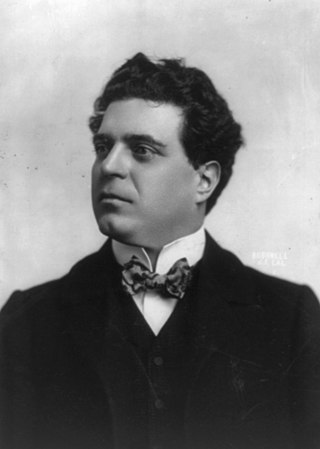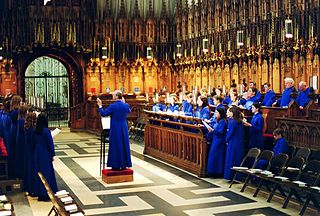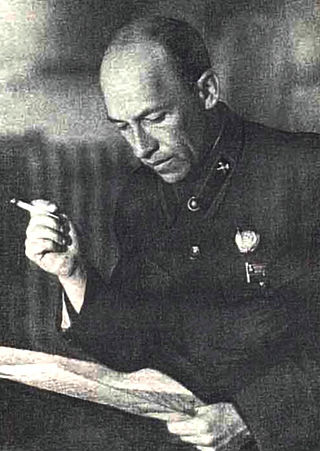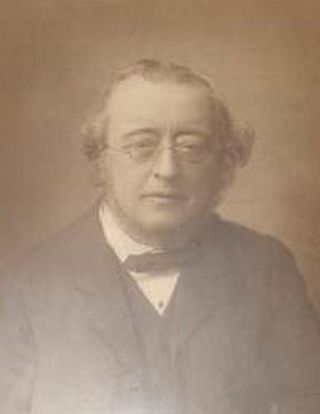Related Research Articles

Pietro Mascagni was an Italian composer primarily known for his operas. His 1890 masterpiece Cavalleria rusticana caused one of the greatest sensations in opera history and single-handedly ushered in the Verismo movement in Italian dramatic music. While it was often held that Mascagni, like Ruggero Leoncavallo, was a "one-opera man" who could never repeat his first success, L'amico Fritz and Iris have remained in the repertoire in Europe since their premieres.

A choir is a musical ensemble of singers. Choral music, in turn, is the music written specifically for such an ensemble to perform. Choirs may perform music from the classical music repertoire, which spans from the medieval era to the present, or popular music repertoire. Most choirs are led by a conductor, who leads the performances with arm, hand, and facial gestures.

Sir Henry Walford Davies was an English composer, organist, and educator who held the title Master of the King's Music from 1934 until 1941. He served with the Royal Air Force during the First World War, during which he composed the Royal Air Force March Past, and was music adviser to the British Broadcasting Corporation, for whom he gave commended talks on music between 1924 and 1941.

Victor August Herbert was an American composer, cellist and conductor of English and Irish ancestry and German training. Although Herbert enjoyed important careers as a cello soloist and conductor, he is best known for composing many successful operettas that premiered on Broadway from the 1890s to World War I. He was also prominent among the Tin Pan Alley composers and was later a founder of the American Society of Composers, Authors, and Publishers (ASCAP). A prolific composer, Herbert produced two operas, a cantata, 43 operettas, incidental music to 10 plays, 31 compositions for orchestra, nine band compositions, nine cello compositions, five violin compositions with piano or orchestra, 22 piano compositions and numerous songs, choral compositions and orchestrations of works by other composers, among other music.

Sigmund Romberg was a Hungarian-born American composer. He is best known for his musicals and operettas, particularly The Student Prince (1924), The Desert Song (1926) and The New Moon (1928).

Franz Adolf Berwald was a Swedish Romantic composer and violinist. He made his living as an orthopedist and later as the manager of a saw mill and glass factory, and became more appreciated as a composer after his death than he had been in his lifetime.
John Treville Latouche (La Touche) (November 13, 1914, Baltimore, Maryland – August 7, 1956, Calais, Vermont) was a lyricist and bookwriter in American musical theater.
John Henry Maunder was an English composer and organist best known for his cantata "Olivet to Calvary".

Jaromír Weinberger was a Bohemian born Jewish subject of the Austrian Empire, who became a naturalized American composer.

Sir Frederic Hymen Cowen, was an English composer, conductor and pianist.

Isaak Osipovich Dunayevsky was a Soviet film composer and conductor of the 1930s and 1940s, who composed music for operetta and film comedies, frequently working with the film director Grigori Aleksandrov.

Alfred Robert Gaul was an English composer, conductor, teacher and organist.

Robinson Crusoé is an opéra comique with music by Jacques Offenbach and words by Eugène Cormon and Hector-Jonathan Crémieux. It premiered in Paris on 23 November 1867.

Frederick Corder was an English composer and music teacher.

Georgy Vasilyevich Sviridov was a Soviet and Russian neoromantic composer. He is most widely known for his choral music, strongly influenced by the traditional chant of the Russian Orthodox Church, as well as his orchestral works which often celebrate elements of Russian culture.
The Adventures of Robinson Crusoe is a French-German children's television drama series made by Franco London Films and based on Daniel Defoe's 1719 novel Robinson Crusoe. The show was first aired in Germany in October 1964 under the title Robinson Crusoe as four 90-minute episodes by co-producers ZDF television, and syndicated in the USA the same year. It was first aired in the UK in 1965 as a 13-part serial. This English dubbed version produced by Henry Deutschmeister also had a new musical soundtrack composed by Robert Mellin and Gian-Piero Reverberi the music composed by Georges Van Parys for the French/German original. The production concentrated not only on events on the island but included Crusoe's other adventures, told in flashback.

Colin James Brumby was an Australian composer and conductor.

Jaroslav Křička was a Czech composer, conductor, and music teacher. He was the brother of poet Petr Křička[de].
Richard Henry Walthew, often known as Richard H. Walthew was an English composer and pianist, and an important figure in English chamber music during the first half of the 20th century.
Achille-Félix Montaubry was a French musician and operatic tenor, active in Paris; later a theatre director. His brother was the conductor and composer Édouard Montaubry (1824–1883).
References
- ↑ A. O'Malley Children's Literature, Popular Culture, and Robinson Crusoe 1137027312- 2012 - Page 166 "Another later example of this sort of musical home theatre is A. J. Foxwell's and B. Mansell Ramsey's Robinson Crusoe. A Cantata or Operetta for Boys (1896). Here, though, the performance takes on the more triumphantly imperialistic tones of late nineteenth-century robinsonades. ...